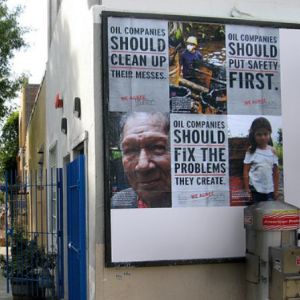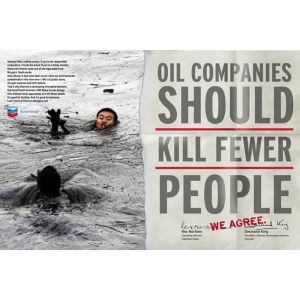The Yes Men: Smearing Oil and Forcing “Identity Correction”
By Leonard JacobsFriday, November 5, 2010
The Lorgnette
By Beck Feibelman
Special to The Clyde Fitch Report
TheLorgnette@gmail.com
The Yes Men have ruined the slick, expensive marketing campaign by the Chevron oil company. Which deserved it.
Here’s a tip for the Chevrons out there: street artists are going to use street art to punish you for disrespecting them by making fake, corporate “street art.” You’re welcome.
The Yes Men are a loose, quasi-anonymous group of artists and activists whose public face is the fearless, charismatic Andy Bichlbaum and Mike Bonanno. (Those are neither their real names nor the only fake names they use.) The group is paradigmatic of an exciting and effective kind of political art. Their projects are political actions whose artistic elements are absolutely integrated with their anti-corporate goals. They use performance, costuming, graphic design, Web design, image making, object making, printing and filmmaking in their incisive “hijinks.”
Their funny, revelatory projects often involve posing as government or corporate officials at conferences or in the media. The trailer for their recent movie, The Yes Men Fix the World, really couldn’t be more entertaining or illustrative. The Yes Men’s strategies aren’t wholly different from, say, Sacha Baron Cohen’s Borat, but they infiltrate and subvert power with a much more utopian aim, committed political bent, lighter touch and no Hollywood financing.
The Chevron ad campaign that the Yes Men turned against the company is called “We Agree.” It was created by the advertising agency McGarryBowen and launched last month. Absent the Yes Men, I imagine it would have been a moving and effective example of corporate communications, if creepily soulless and spectacularly cynical under the surface.
Their posters and videos maximize a direct appeal to the audience’s empathy with the-right-kind-of-good-looking, diverse models gazing straight out of the frame into “our” eyes. The conceit is that “we” are supposed to agree with kumbaya, anodyne slogans suggesting how relatable Chevron is, how much the company shares “our” values.
“We” are also supposed to totally not know about Chevron’s environmental and human rights abuses in Ecuador and Nigeria, among many, many other places:
To their detriment, Chevron provoked the corporate resistance crowd — the Yes Men — not only by emphasizing a vaguely lefty authenticity angle in their ads, but, more important, by co-opting a street art aesthetic. The real Chevron posters are finely crafted to look like simple, un-crafted, declarative challenges to safe “problems” with the oil industry. The copy is forthright, soothing: “Oil companies should put their profits to good use”; “Oil companies need to get real.” They even tried to hire legitimate environmentalists to shill for them in their ads.
Across the bottom of each poster the words “We agree” is printed askew, as if produced by hand with a rubber stamp in red ink. The messages are “signed” by various Chevron executives. Pre-printed on the Chevron ads are fake fold creases. They’re meant to be wheat-pasted up on walls as if arising out of grass roots, not placed pristinely on billboards, though the company used a marketing budget more than sufficient for that.
 The
Yes Men made posters that follow Chevron’s template exactly. But these
posters have pictures of oil spills or indigenous Ecuadorians and more
pointed slogans like “Oil companies should clean up their messes” and
“Oil companies should put safety first.” It goes without saying that
messes, non-safety and disenfranchised people are exactly what Chevron
hopes no one will think about. These posters are also “signed” by the
same real Chevron executives and stamped with “We agree.” As spoofs,
these are very effective at calling attention to Chevron’s willingness
to spend astronomical sums to polish their corporate image and
unwillingness to acknowledge, much less pay to fix, the real disasters
and problems caused by their corporate product.
The
Yes Men made posters that follow Chevron’s template exactly. But these
posters have pictures of oil spills or indigenous Ecuadorians and more
pointed slogans like “Oil companies should clean up their messes” and
“Oil companies should put safety first.” It goes without saying that
messes, non-safety and disenfranchised people are exactly what Chevron
hopes no one will think about. These posters are also “signed” by the
same real Chevron executives and stamped with “We agree.” As spoofs,
these are very effective at calling attention to Chevron’s willingness
to spend astronomical sums to polish their corporate image and
unwillingness to acknowledge, much less pay to fix, the real disasters
and problems caused by their corporate product.
While the Yes Men’s project is ultimately — and reasonably — earnest and righteously indignant, it remains playful and resists being preachy. Their posters, parody video ads and even hyper-realistic press releases purporting to be Chevron’s are all produced with exquisite skill and dark, dry humor.
The Yes Men also take an open and communal approach to the whole endeavor. They set up a website, called chevronthinkswerestupid.org, as a hub for anyone interested in getting involved. Being very communications and technology savvy, they provide everything a budding participant-subversive might need, including high resolution images of the spoof posters for anyone to print (or wheat-paste) up. Beyond that, there is a Photoshop template and the actual font from the original posters available for download so anyone can DIY. Finally, they put up a gallery and are sponsoring a contest for the best parody posters created.
Funny or Die has gotten on board with a remake of one of Chevron’s TV ads, which is a good sign of cultural traction:
It’s a spot-on parody of an actual Chevron TV ad, which is extra hard to take after the Funny or Die version.
The Yes Men have a remarkable track record of getting embarrassing public attention for huge multinational corporations with the real details of their own wrongdoing. For example, on the 20th anniversary of the 1984 Union Carbide chemical spill in Bhopal, India, Bichlbaum went on TV as a spokesman for Dow (which had acquired Union Carbide in the interim) and announced that the company would make restitution to the still-suffering victims. Dow never stepped up in Bhopal, but the prank did cause the company’s stock to fall by $2 billion — $2 billion! — although only temporarily, until the real company made it clear to the press that they had no intention of taking responsibility in Bhopal.
We can all look forward to seeing what happens to Chevron.
You can see a bunch of the Yes Men’s videos of their various projects online, and they’re well worth watching.
Beck Feibelman is an art historian and cultural critic. A specialist in contemporary art, he is especially interested in art since the 1980s. His writing investigates identity, performance, art and celebrity, and the blurred line between art and “real life.” On Twitter: http://twitter.com/feibelman.
Tags: advertising, art, performance, politics





